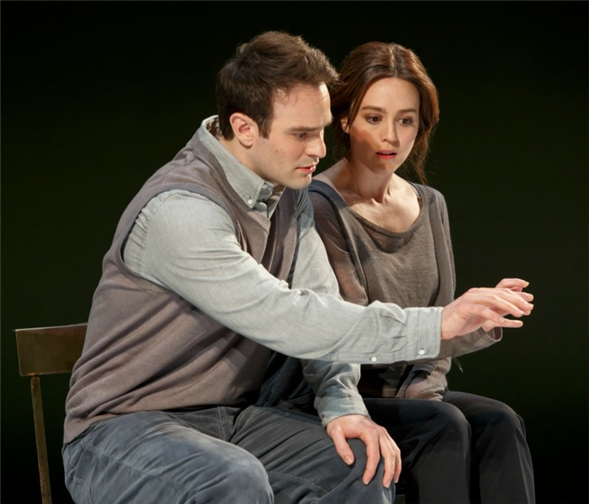Why Charlie Cox is Repeating Himself
Home > TDF Stages > Why Charlie Cox is Repeating Himself

The Daredevil star makes his NYC stage debut in a mind-bending play
—
Welcome to Building Character, our look at actors and how they create their roles
Although Charlie Cox is best known stateside for starring as the blind street defender in Netflix’s dark superhero series Daredevil, he started out in theatre in his native England. After training (briefly) at the Bristol Old Vic Theatre School, he starred in London productions of ‘Tis Pity She’s a Whore, Pinter’s The Lover & The Collection, and The Prince of Homburg while simultaneously appearing in films (heartthrobs in Stardust and The Theory of Everything) and on TV (a two-year stint as an Irish gangster on Boardwalk Empire). Last year, the success of Daredevil catapulted him to a new level of fame as he joined the Marvel universe, and that’s when he realized he had been away from his first love — the stage — for too long. He called his agent, and the very next day he was reading Nick Payne’s play Incognito. He knew almost instantly that he wanted to do it. Now, six years after he last trod the boards, the rakish actor is making his New York City stage debut at Manhattan Theatre Club in Payne’s trippy meditation on identity and the limits of the mind. Cox spoke to TDF Stages about why he chose this play, why he’ll never do a musical, and why he’s not worried about repeating himself.
TDF Stages: Since you’re in such a hot TV show right now, I suspect you could have made your debut in a Broadway production. What drew you to Off-Broadway and Incognito?
Charlie Cox: To be very honest, it seemed too good to be true. I get to play six characters, two of whom are English, so it’s quite nice to use my native accent; the playwright is Nick Payne [of Constellations fame]; the director is Doug Hughes; it’s staged in a lovely, 300-seater so I don’t have to worry about projecting my voice too much, which might have been a concern in a big theatre because I haven’t been onstage for so long. The whole thing has just been such a lovely experience.
TDF Stages: In a recent interview, you said that you enjoy theatre because you get “to tell a story in its entirety from start to finish in order,” which isn’t usually the case when you’re shooting scenes out of order for a film or TV show. Yet in Incognito you play multiple characters whose respective journeys are interwoven into a nonlinear narrative. So perhaps this is more like shooting Daredevil than you anticipated!
Cox: It’s true that this play is a little different than doing what you would call a traditional story onstage. But the main character I play, Henry, has an arc. I think the main thing that excites me about doing a play is the rehearsal period. I’ve always felt like when you do TV and film, you kind of have to put on camera what your instincts are, and what you’re capable of in that moment. When you do a play, because of the extended rehearsal period and previews, you get an opportunity to raise the bar on your ability, to try things out. Sometimes they don’t work, but sometimes they do. And when they do, you get to add a color to your palette that you can access at a later date. That really is the most exciting thing I think for an actor, to have that freedom.”
TDF Stages: In Incognito, you play a half dozen characters from different time periods and of varying nationalities and temperaments. A few are based on actual people, notably Henry, who suffers from a profound amnesia that prevents him from making new memories. How much research did you do into his real-world counterpart?
Cox: I always do as much research as I possibly can. You can find little bits and bobs that explain a moment; you never know what you’re going to discover. Henry is actually based on two different people. He’s based mainly on a gentleman named Henry Molaison, who was known as patient HM. There’s a lovely book called Permanent Present Tense, which is about his life, and the unfortunate operation that he had that led to his amnesia. Henry lived for another 60-something years, and in that time they were able to do countless tests on him and of course he never got bored or frustrated because he didn’t know any better. As a result, there was research done on his mind that was able to explain a lot of what we now know about short- and long-term memory, how information is stored and all that kind of stuff. The other character he is based on is an Englishman named Clive Wearing, who’s still alive. He was a musician, hence the piano playing in the show, who suffered a bad headache, and woke up with a similar kind of amnesia to Henry: a 30-second memory. If his wife leaves the room to go to the loo and returns, he greets her as if he hasn’t seen her in years, which is what Henry does in our play. But what’s surprising about him is that he can play the piano for longer than 30 seconds! If you give him a piece of music, he plays and plays and plays, which is such a fascinating discovery.
TDF Stages: Save for his intense love for his wife, your character, Henry, remembers nothing. He starts to have a conversation and after about 15 or 20 seconds it’s like someone hits the reset button. To illustrate this, Payne has you repeat some of the same lines several times. The way he greets his wife, ‘Hello my love, where have you been? It’s good to see you,’ over and over, is haunting. Was that challenging as an actor, to have to keep replaying the same moment?
Cox: That’s a very good question. You know, whenever I see my brother, he always says, “‘Ello mate!” in the same way, the same intonation, and I’m sure I greet him in the same way every time. I think that’s very human, regardless of how your mind works or what your memory is doing. Similarly with Clive, in videos when he greets his wife Debra, he doesn’t necessarily use the exact same words, but the emotion that he feels when seeing her is very, very similar each time. Because he loves her! Also, people probably aren’t picking up on this but the lines that Henry says are ever so slightly changed. So in the first Henry scene he says, “Where have you been?” twice. In the second Henry scene he only says it once. In the third Henry scene he doesn’t say it at all but he does say, “I thought you’d left,” which he says in all of his scenes. They’re all slightly different, which is very complicated to remember when performing! He also gestures in a particular way — it’s quite human to have a certain gesture that your body is used to doing when it experiences certain feelings. What I’ve tried to do is tread that line a bit. I don’t think they should be absolutely identical, but I think they should be reminiscent of each other.
TDF Stages: You also play five other characters, including Albert Einstein’s son Hans, a misogynistic Australian lawyer, and a journalist who befriends Thomas Harvey, the pathologist who kept Einstein’s brain in a jar for four decades. Like your cast mates, you don’t have the benefit of costume or scenes changes, only your voice and physicality to denote the different people. Did you worry you wouldn’t be able to delineate the characters?
Cox: I didn’t actually. Just from doing the read-through it became evident that the less interruption from a technical point of view, the better. I think the more you can just allow the words to transport you in and out of character, the more compelling it will be. This play is all about identity. So having the same actors go in and out of these people and kind of mess with the idea of identity I think is essential. You do the work on each individual character and then you just turn it on, your body and your voice.
TDF Stages: Given its complex structure and multiple characters and storylines, Incognito is a play that demands the audience pay attention. And yet, about halfway through I realized that I was working too hard to try to put the pieces together. All of the disparate threads certainly inform, reflect, and echo one another thematically and emotionally, but they don’t necessarily fit snugly together like a puzzle.
Cox: That’s one of the things I love about this play. Once you get two or three scenes in, you realize that you just have to let it wash over you. You’re never going to be able to kind of cling onto the understanding of it. But hopefully, by the end, you have a sense of who these people are and how they’re linked, and the themes of the play without having necessarily understood every given moment. As an audience member, you feel like the character of Henry, because you’re constantly meeting people and you’re not sure if you’ve met them before. That’s how Henry feels throughout his entire life!
TDF Stages: Although Daredevil has not yet been renewed for season 3, you are doing The Defenders, so you’ll be NYC-based for a bit longer. Would you like to do more theatre and would you ever consider being in a musical?
Cox: Not if the producers want to sell any tickets! I mean I love to sing — I’m just not very good at it. But my love for theatre came from musicals. When I was growing up, I lived near a theatre where The Buddy Holly Story played for years, and I would always go on my birthday, and I just absolutely loved it. So I’m a huge musical fan, I just sadly can’t hold a tune. I am not lying to you when I say I am tone deaf. I’m not being humble. I’m genuinely a terrible, terrible singer. I’m so bad that I’m not even insecure about it. But as for theatre, if I’m lucky enough to continue working as an actor for the duration of my career, I don’t ever want there to be too long a gap between stage shows. I think theatre is oxygen for the actor, if that’s not too much of a, I guess the word is obnoxious expression.
Note: This conversation had been condensed and edited.
—
Follow Raven Snook at @RavenSnook. Follow TDF at @TDFNYC.
Photos by Joan Marcus. Top image: Charlie Cox and Heather Lind.
TDF MEMBERS: Browse our discounted tickets to theatre, dance, and concerts.

